News
Hosted by the governing DPP (Democratic Progressive Party) under the theme “The Future of Democracy in Asia” Liberal International sent a large delegation to join in the celebrations for the 30th anniversary of the CALD group and to support the Taiwanese colleagues.
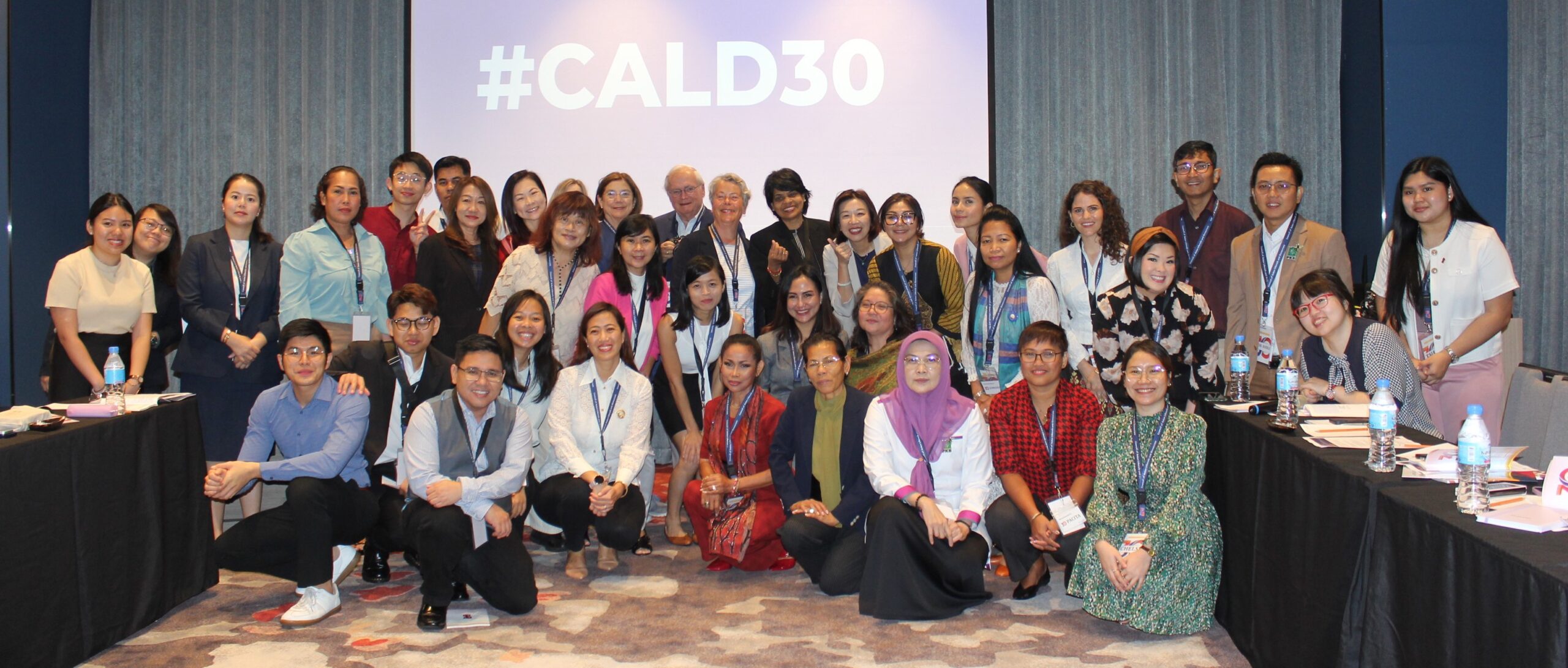
In this region they are facing growing illiberalism and authoritarianism. The heightened tensions in the South China Sea and the East China Sea have brought not the End of History but the beginning of a new era of competition. Democracies are being tested for their unity and the strength of their convictions.
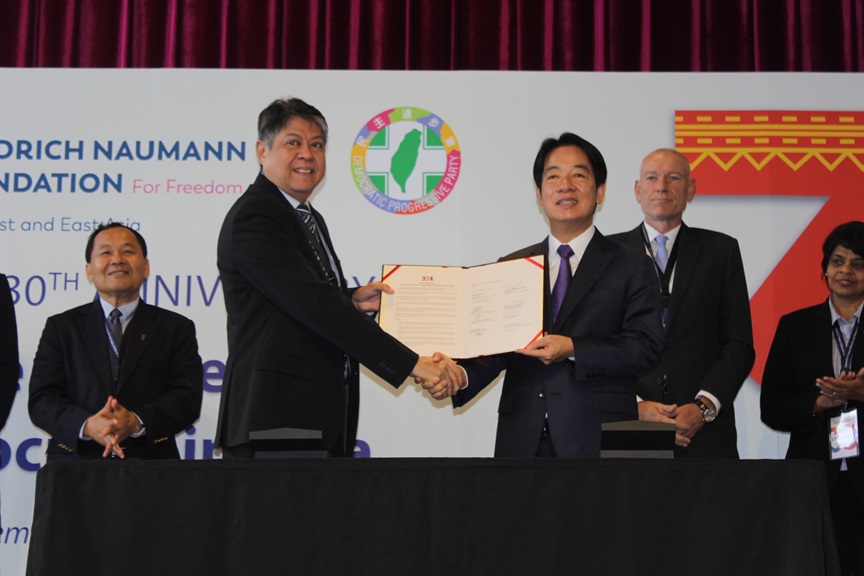
“We are faced with the rise of authoritarianism and must respond to increased tensions, we can work together as societies and countries that are bound by shared values and interests” that was the message from Taiwan’s Vice-President and 2024 presidential candidate, Lai Ching-Te, as he addressed the 30th anniversary congress of CALD. “This is our greatest strength and it is also the reason democracies will prevail”, he added. “we not only commemorate those past 30 years, but also present a roadmap for the future, with peace as the lighthouse and democracy as our compass, we will work together to bring a better future for people across this region”.
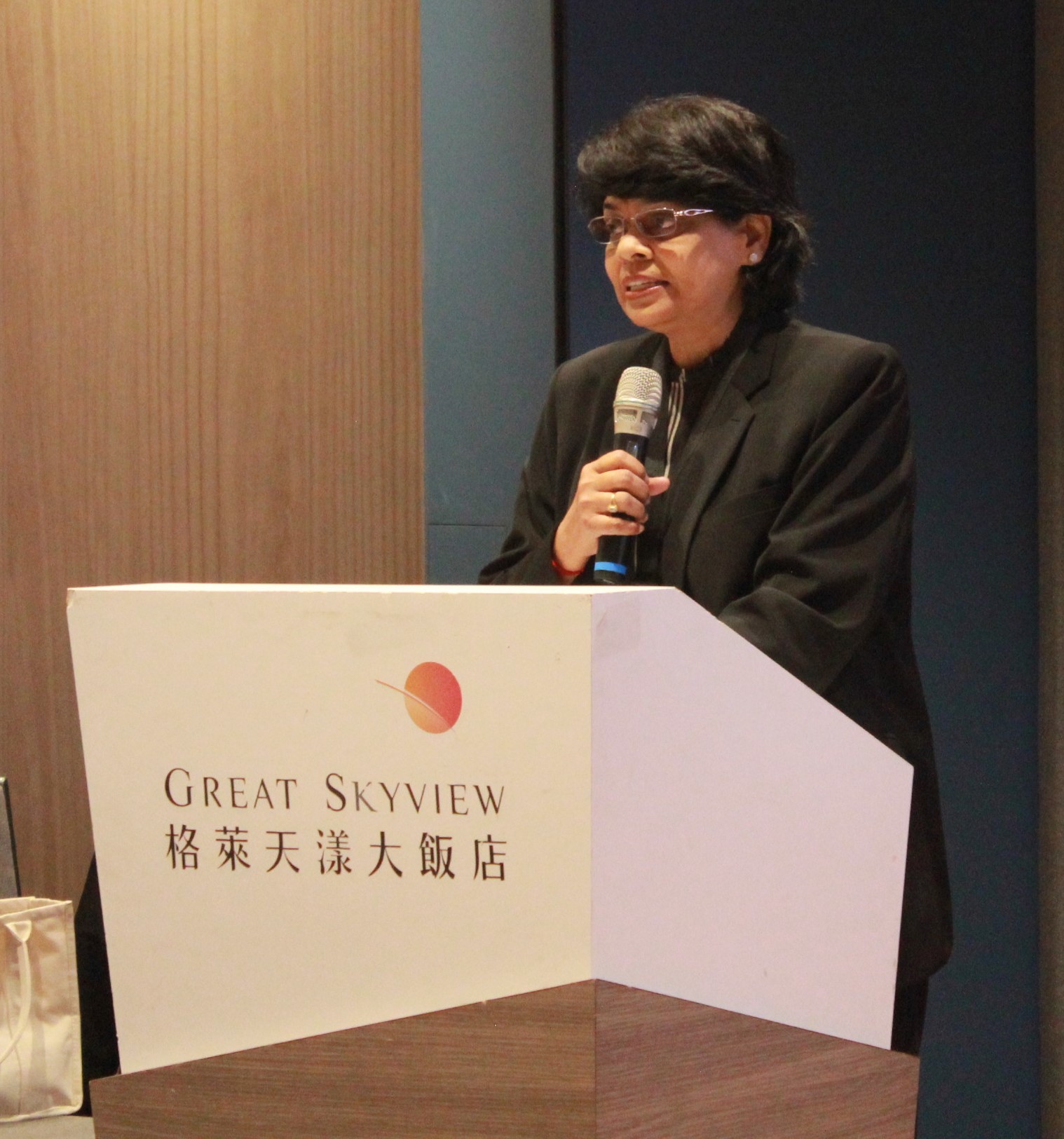
Taiwan Vice president Lai Ching-e, along with other representatives and partners signed the Joint Declaration on the Current State and Future of Democracy in Asia. One of the partners was our president Jayanthi Devi Balaguru for INLW.
Continue reading
On Tuesday evening, August 29, 2023, the annual dinner of LVN and INLW took place in Rotterdam. It was another animated evening.
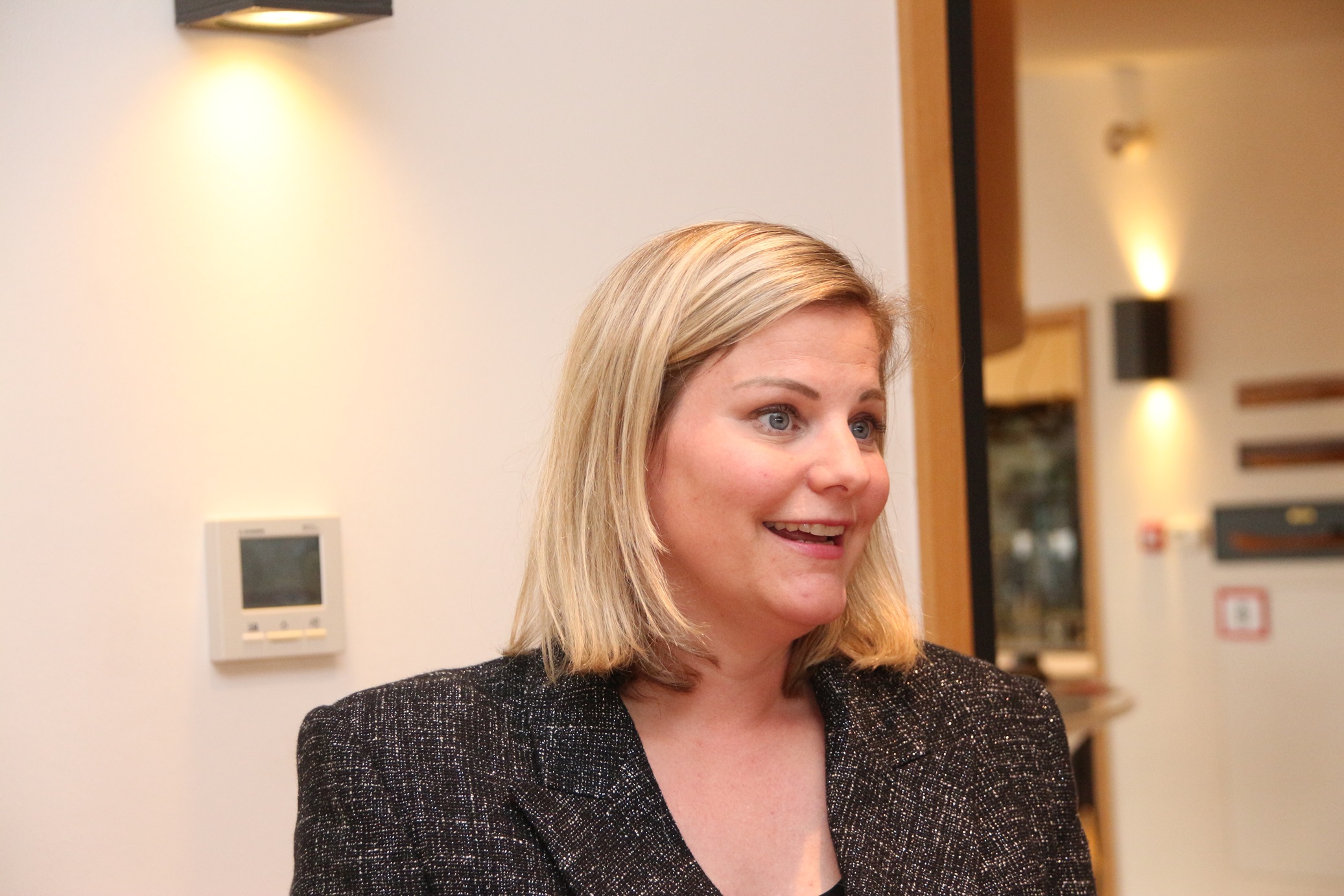
This time we had as our guests, Minister for Foreign Trade, Liesje Schreinemacher and
Group Leader in the European Parliament, Malik Azmani.
It was a packed room with more than 40 ladies and a few gentlemen who were able to get to know these two VVD politicians.
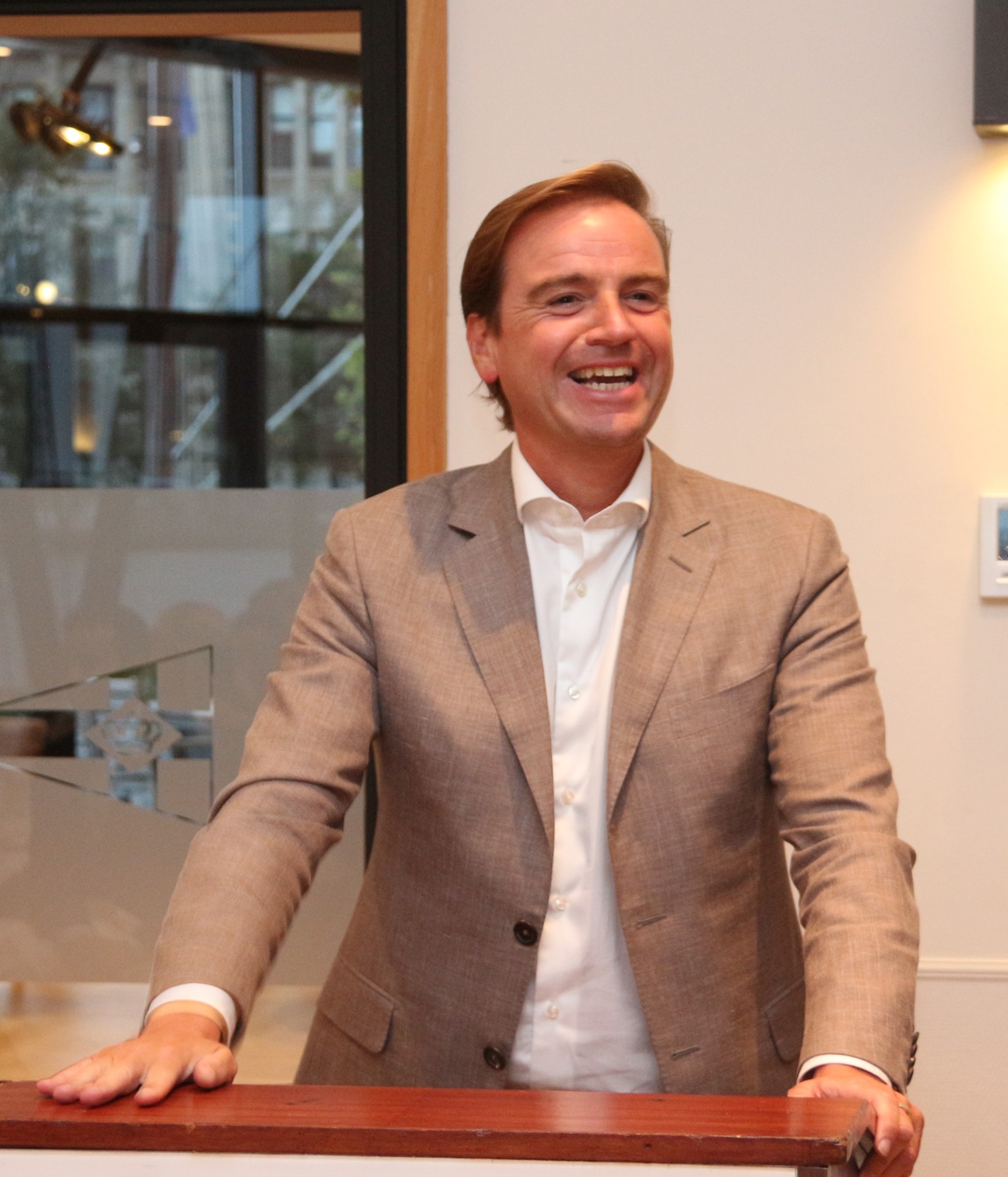
Minister Schreinemacher explained about her work and that foreign trade may seem far away, but it has a lot to do with the Netherlands as the Netherlands are an open trading country. A special time is also coming for her as a caretaker minister. We have to wait and see what she can do in the coming months until the elections.
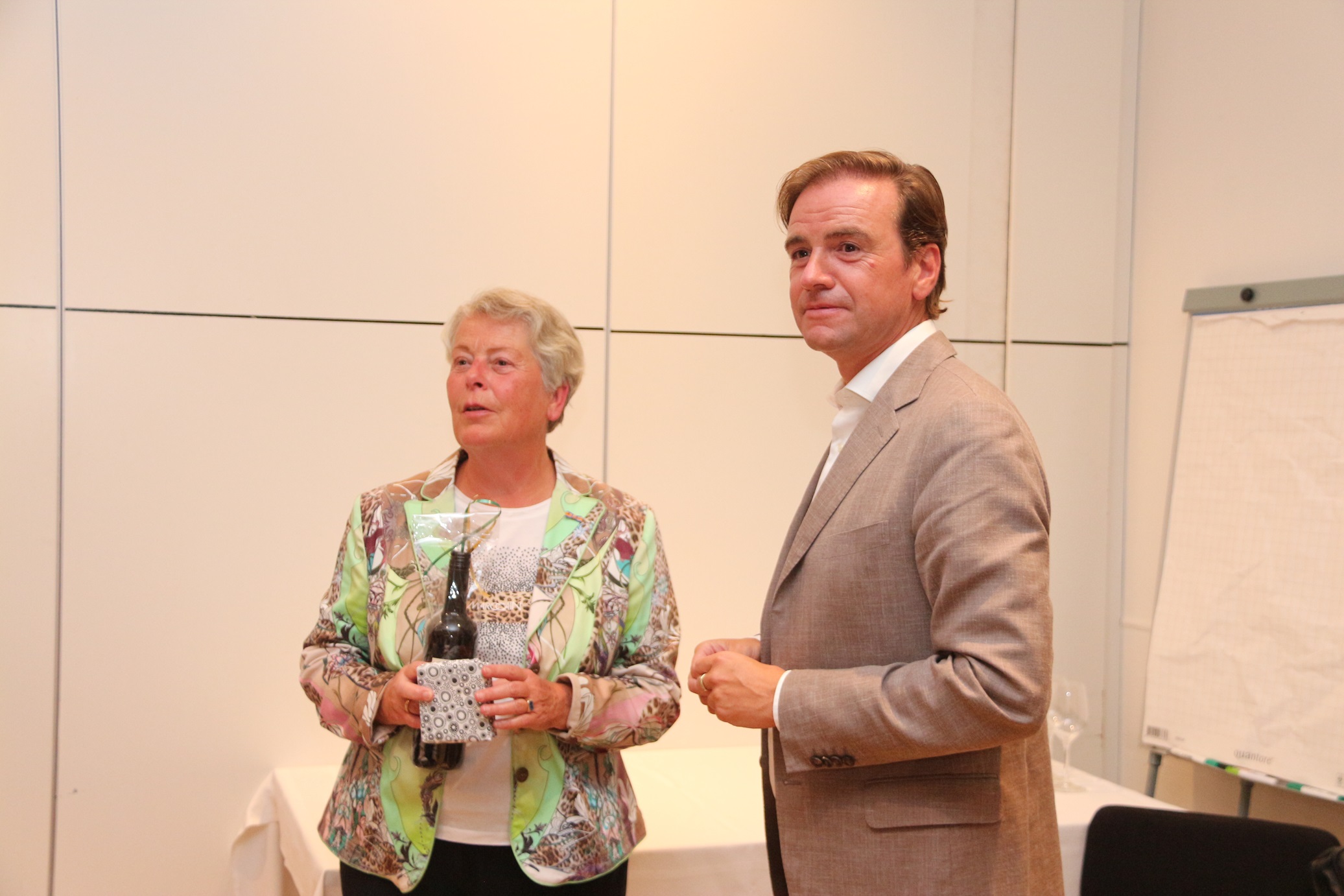
After that the 22nd of November, with a new chamber, it will be very exciting to be able to make decisions and still get things done in the period of the negotiations of the parties that are trying to form a new government. It may take several months before a new government is installed and thus new ministers will be sworn in to take over her portfolio.
Before that, the minister, who has just become pregnant, will have been away on maternity leave for some time.
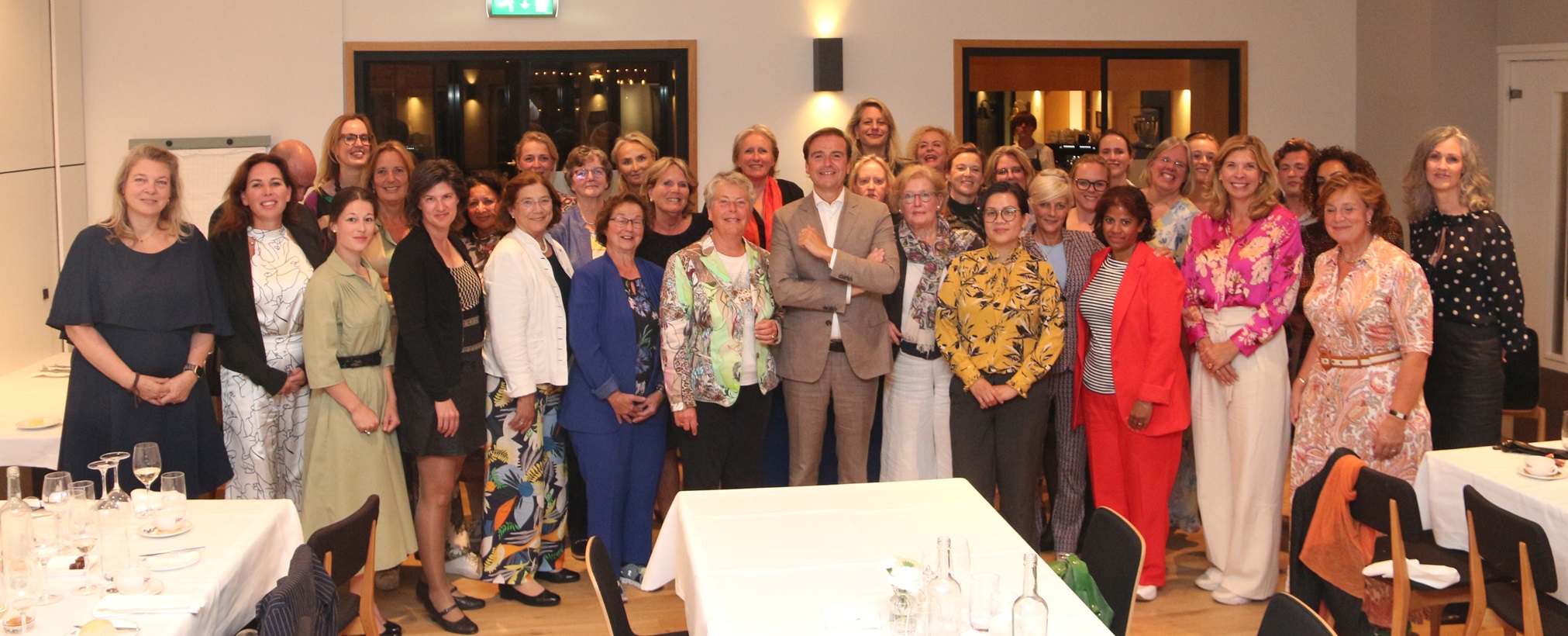
It also is a different world for Member of Parliament, Malik Azmani, now that the Dutch are all busy for the next elections in the Netherlands and therefore the European elections of next year in June 2024 have clearly faded into the background.
Azmani did admit to a question from one of the ladies that he would like to be the party leader for the VVD in the Euro parliament for another round.
At the Blue Economy Summit an event at which we wanted to connect leading figures from the world of science, institutions, entrepreneurship and finance we discussed the current status of the ocean and the urgent need to build a BLUE ECONOMY. INLW Board member, Ruth Richardson, had the opportunity to speak during the panel on “The role of the People in Cities and in Ocean Water”. She spoke about the role of Women in society, in the cities but also on the climate, among other things water and the ocean.
Women are the pioneers of a nation! According to a report of the United Nations Secretary General, António Guterres, “Women constitute 50% of human resources, the greatest human resource next only to man, having great potentiality”. “That is why we must not forget to empower women by making use of their talent, their leadership, experience and their knowledge in this sustainable developing world we are living in. They are also the change makers, in the cities, in our society and in climate change”.
There were many other speakers such as Riccardo Bonadeo President of One Ocean Foundation; Vladimir Ryabinin Executive Secretary IOC-UNESCO; Sylvia Earle Oceanographer Mission Blue, explorer, author, and lecturer; Stefano Pogutz President of One Ocean Foundation’s Scientific Committee and my dearest friend and colleague Martina Rogato. She is one of the most influential and talented women I have ever met.
The conclusion is that even Women can change the course of our future. Our Ocean water is Life!
Ruth Richardson
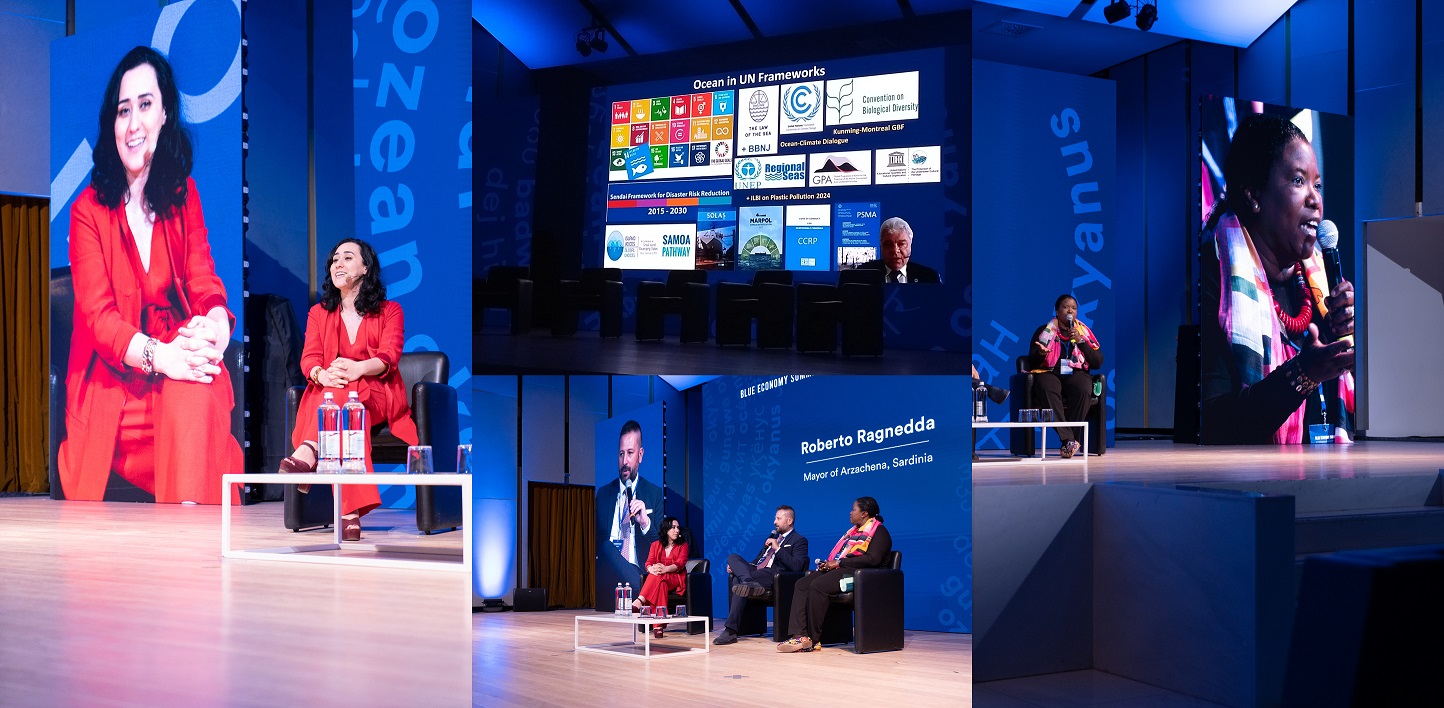
It is many years ago that LI held a meeting in Canada. Although Canadian involvement in LI goes back to the beginning of the organization in 1947. One of the main observations was that liberalism is under attack in many parts of the world and unfortunately populism and nationalism are on the rise.
It was therefore very good to meet and to unite in our common cause as liberals. After our ExCom Meeting all participants were invited to attend the Convention of Canadian liberals following the ExCom.
INLW had tabled 3 resolutions:
“Women and Girls and STEM” (science, technology, engineering and mathematics).
“Supporting Taiwan’s Defense, Increased Participation in International Affairs and Further
Collaboration with World Democracies” (INLW and DPP)
“The treatment of Uyghur women and condemning the naming of Peng Liyuan as Special
Envoy for the Advancement of Girl’s and Women’s Education” (INLW and DPP).
All resolutions were accepted by vote by the Executive Committee Meeting.
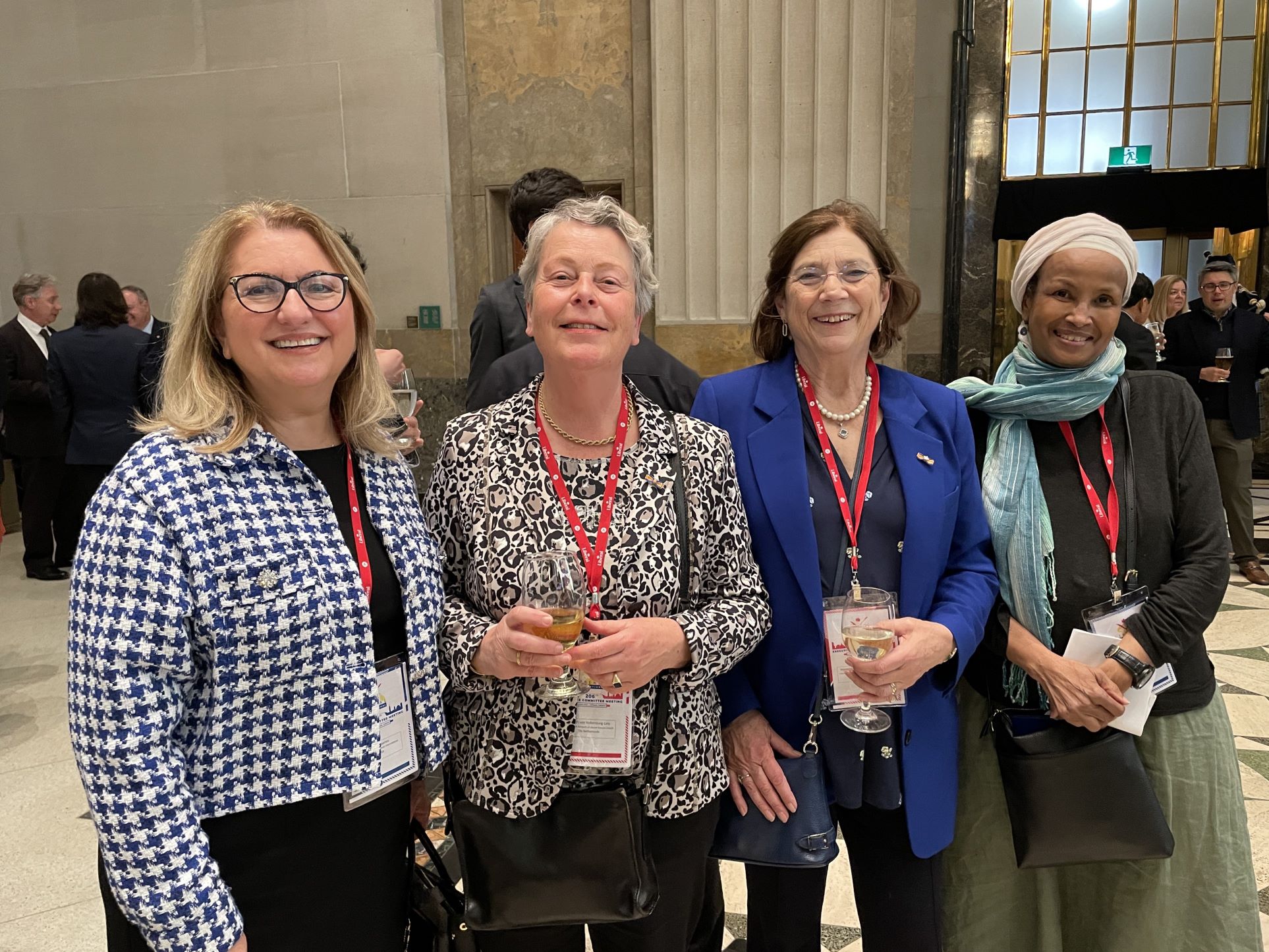
Treasurer Lysbeth van Valkenburg met our Patron Lorna Marsden in Torontoa before the meeting. Unfortunately she was unable to attend the exc. Meeting.
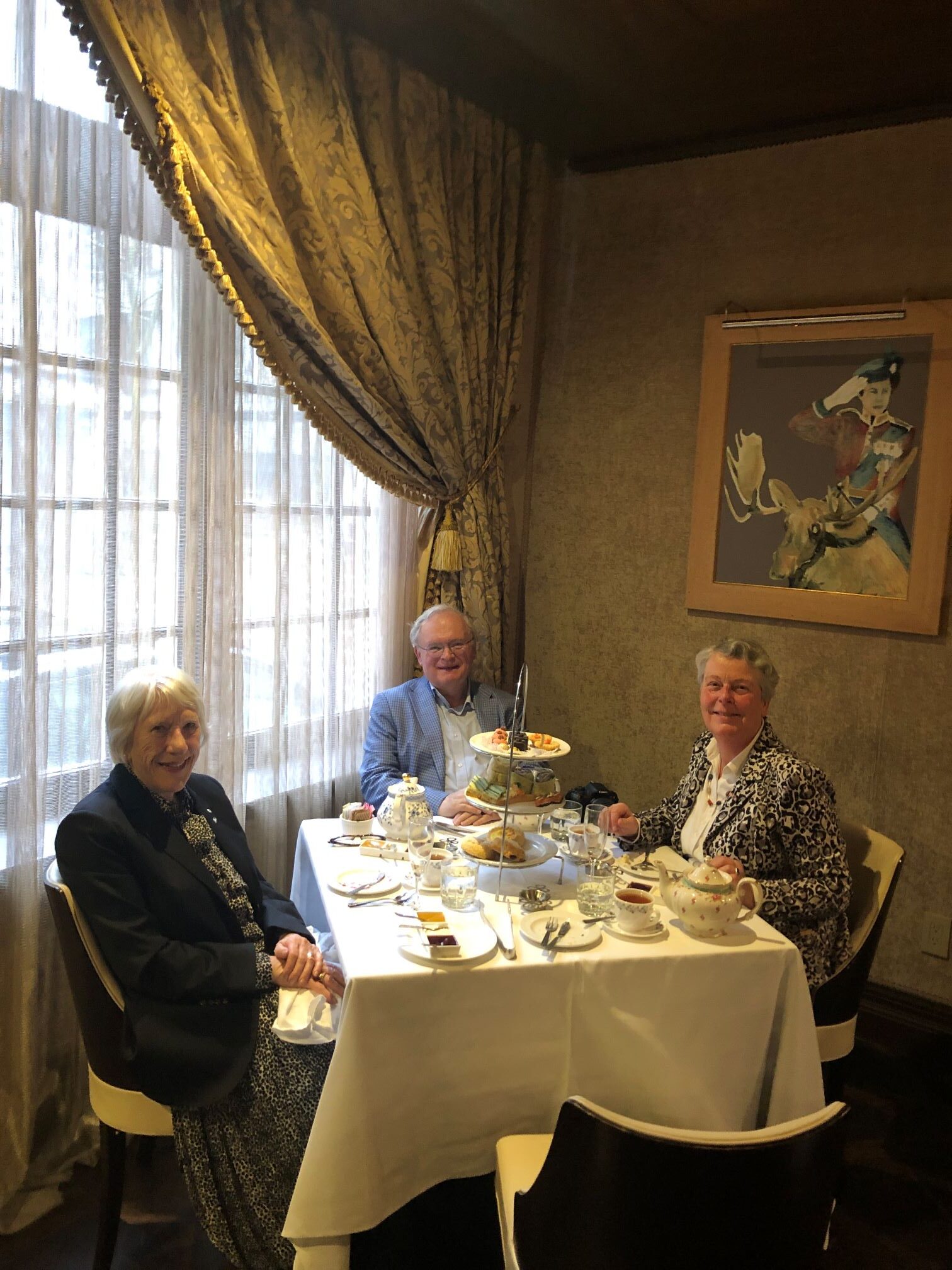
The first evening the welcoming reception was hosted by the Canadian Group of LI in the Sir John Macdonald building.
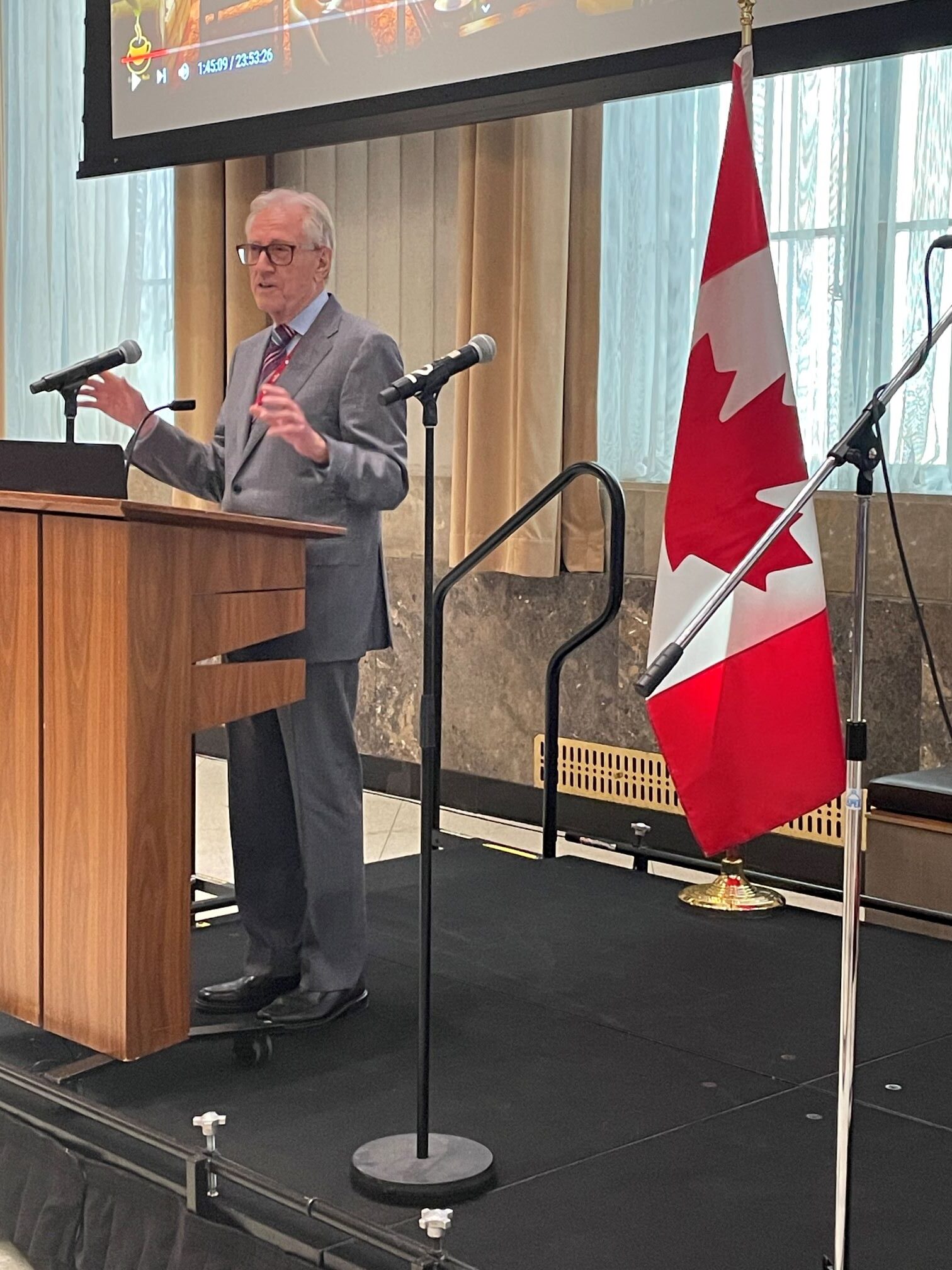
We were welcomed by Sen. Art Eggleton, president of the Canadian Group of Liberal International and Vice President of the LI Bureau, and LI president Hakima el Haité.
Quite a few of the Canadian parliamentarians were present, Leah Taylor Roy, MP on behalf of the Liberal party Canada Parliamentary Caucus also welcomed all guests but especially the women. As we can see there were quite a few women present.
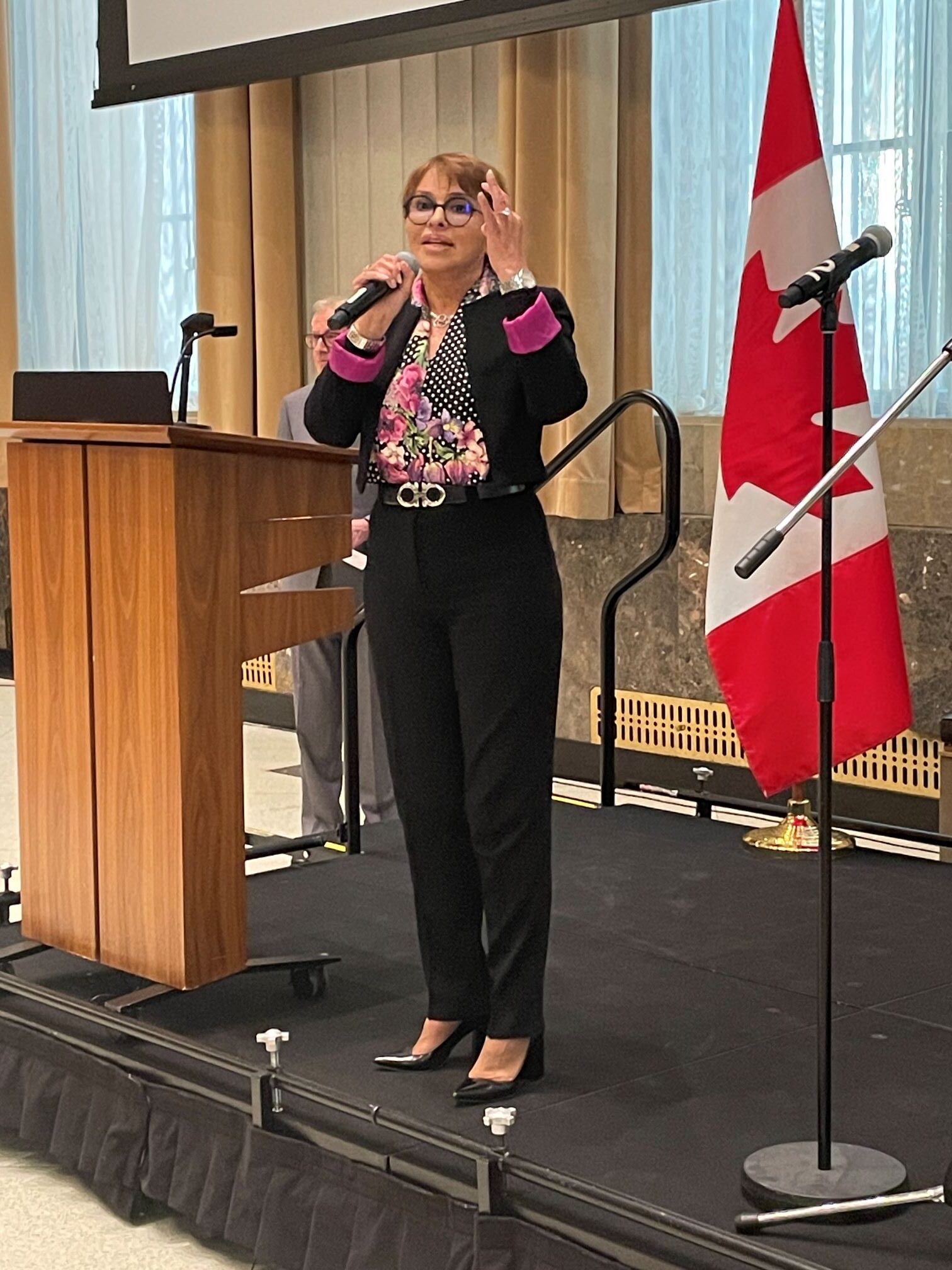
In Canada about 30% of the MP’s are female and she is trying to get more women interested in politics. It is clear that the number of women worldwide is still far from representative of the population they represent. We hope to see some of our Canadian ladies as new members of INLW.
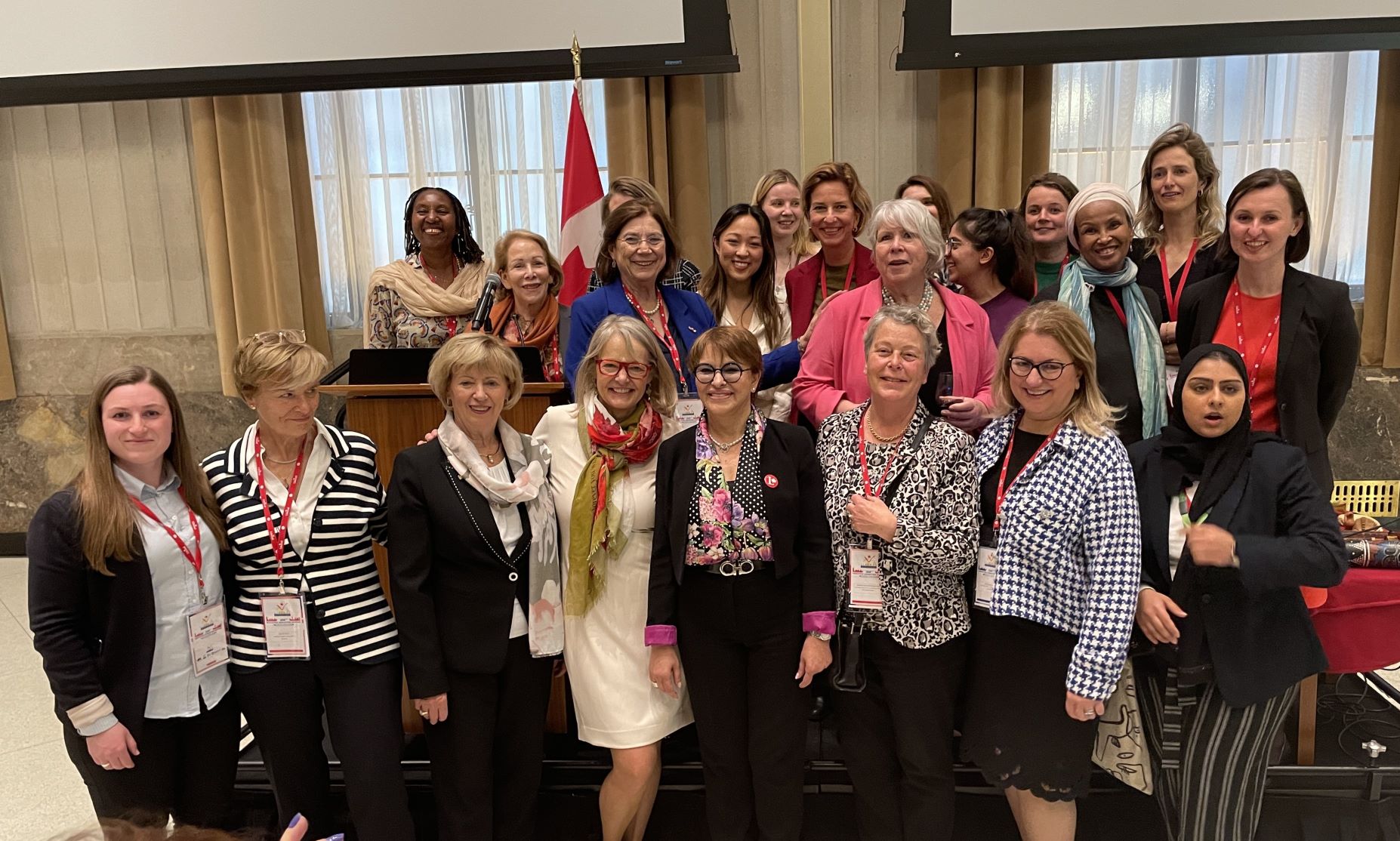
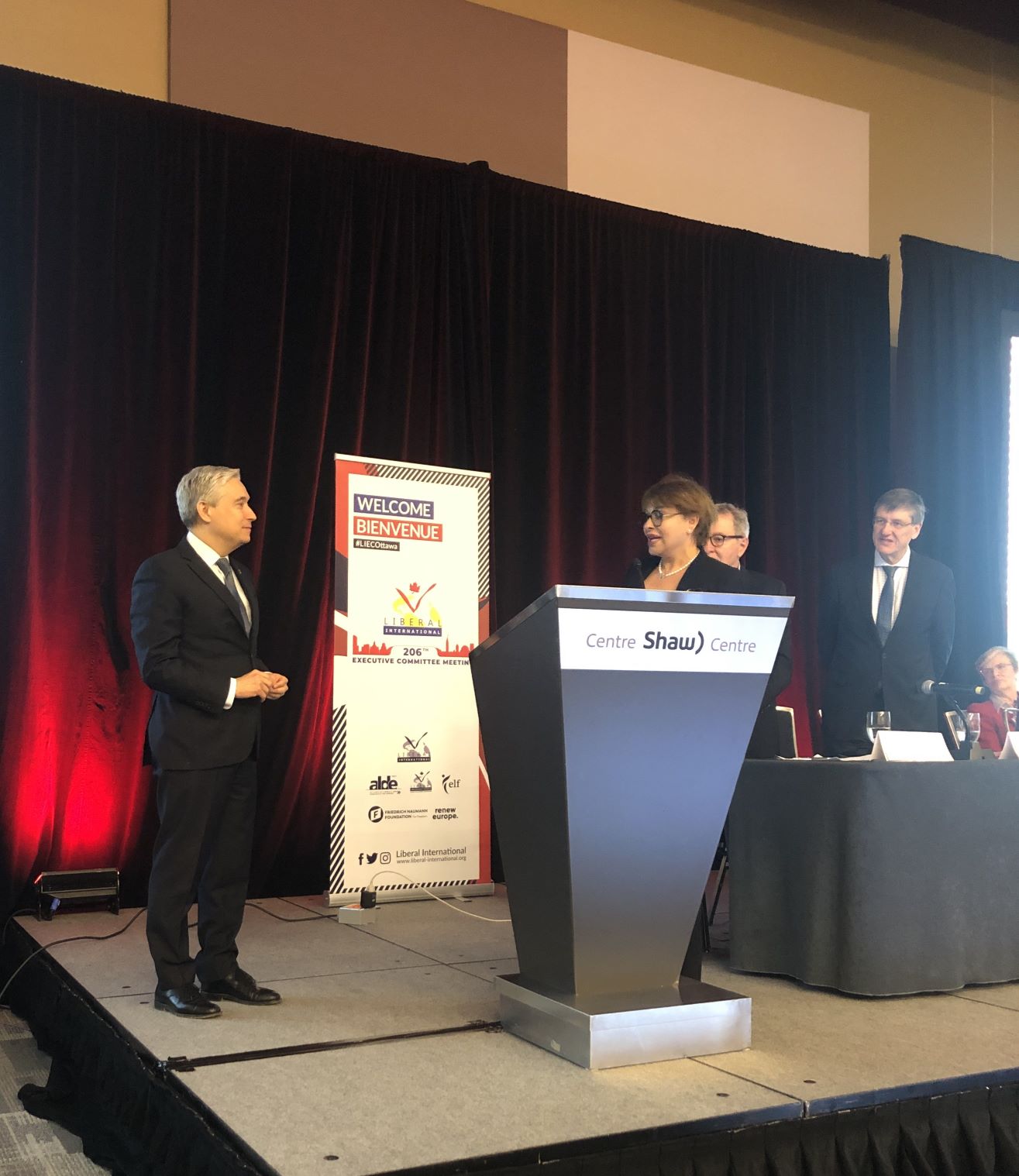
At the opening of the meeting Francois-Philippe Champagne, minister of innovations, science and industry of Canada, gave us an oversight of the problems at the moment.
“The difference of the things that we find important, we as liberals go for possibilities and are optimistic. The word ‘ a liberal’ is better changed in the discussions to ‘ a person with our values’, we share our values with many people, we want a fair agreement in our relations with a fair partnership in which dignity is leading, let’s not leave anyone behind”.
Hakima el Haité stressed that peace is most important, next to food security, energy security, climate change, AI and digitalization.
The war is visible in all these things. We are at the moment in a world where mistrust is found by many people, populists are often good speakers with so called very simple solutions to difficult problems.
We must defend our system, we are safe-keepers of our values, peace and rights. But we have to make our decisions much more with support of the people it concerns. We also have to commit to the Paris agreement of 2015. We must reduce the inequality in the world, work with a fair agreement and partnership.
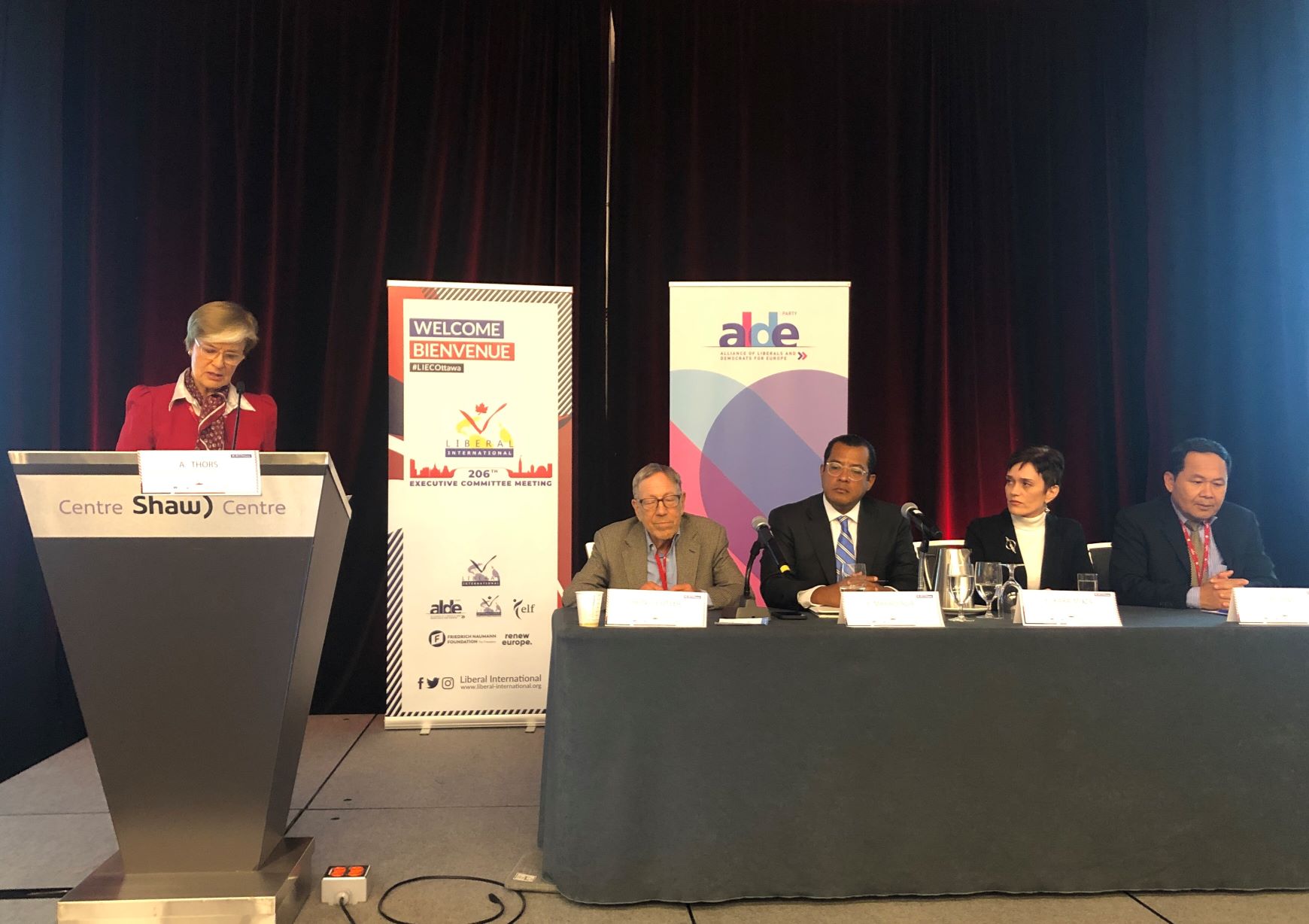
This year the Prize for Freedom was awarded to Vladimir Kara-Murza, journalist and opposition leader in Russia who was convicted in April to 25 years imprisonment in Russia. His wife was present during our meeting. She stressed that this prize can help to keep him safe and it shows that we don’t forget our imprisoned friends.
In his nomination letter LI Human Rights Committee member and former Canadian Minister of Justice Irwin Cotler wrote, “Vladimir Kara-Murza gives expression to the very best of what the concept of freedom represents, and whose heroism stands as an abiding example for all those who share a commitment to human rights, democracy, and the advancement of peace.”
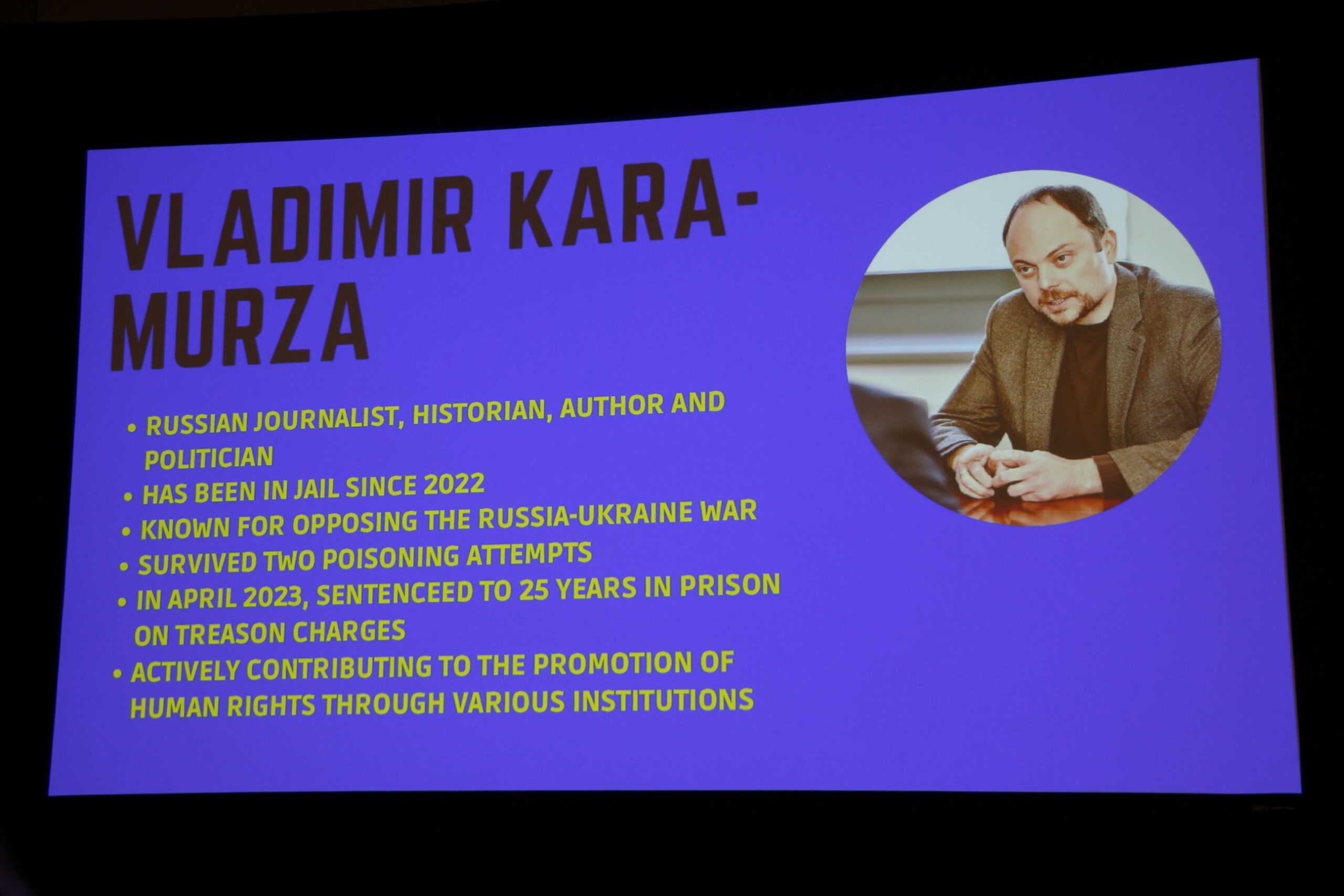
“Vladimir Kara-Murza has without sparing himself fought for democracy and human rights in the Russian Federation. He has successfully advocated for targeted Magnitsky sanctions on human rights offenders,” notes Human Rights Committee Chair Astrid Thors.
The question remains what to do against dictators, release of such a prisoner will only be done if the dictator is put under pressure and that is mostly economic. But we also have to get it legally arranged, legally is never important for a dictator. Only self-interest of the country with economic advantage will get political prisoners out.
The war in Russia will continue so we have to get the sanctions working and keep the pressure on.
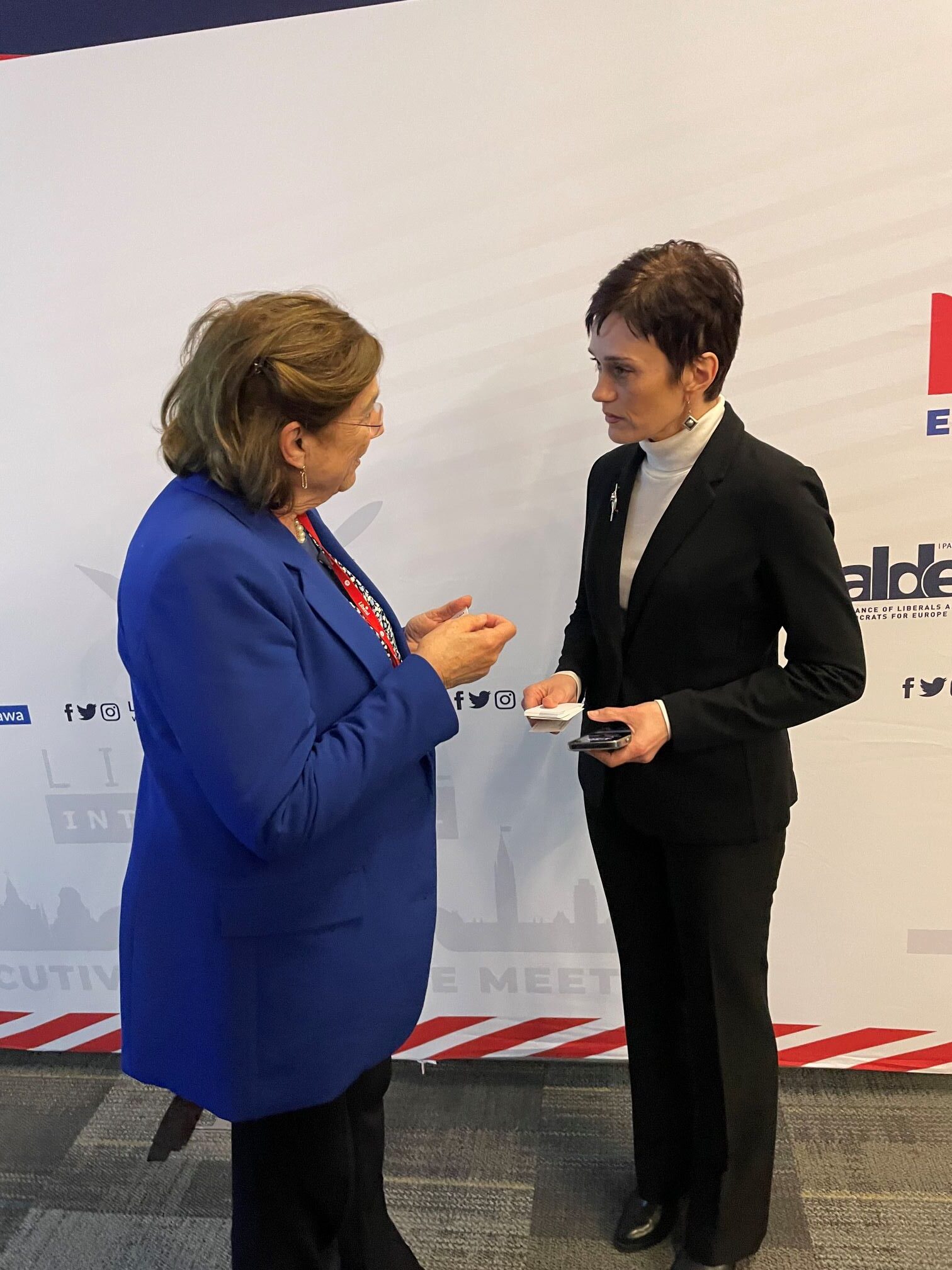
The LI Human Rights Committee organized a parallel session on organizing from Opposition, Overcoming Political Oppression: Evgenia Kara-Murza the Advocacy Coordinator of Free Russia Foundation and wife of imprisoned Vladimir Kara-Murza after working as an interpreter has joined her husband in advocating for human rights accountability and promoting civil society and democratic change in Russia. She is approaching all people like heads of state to ask for them to keep asking for freedom for Kara-Murza. She believes that keeping the name mentioned is the only way to get him free and save his life as he has already twice been poisoned badly and that has seriously damaged his health.
Also Mardi Seng spoke about his sister Theary Seng who is a political prisoner in Cambodia where the President stays on and ignores the results of Presidential elections and imprisons all opposition. She is determined that “wrong will be right” eventually. Only her brother may visit her.
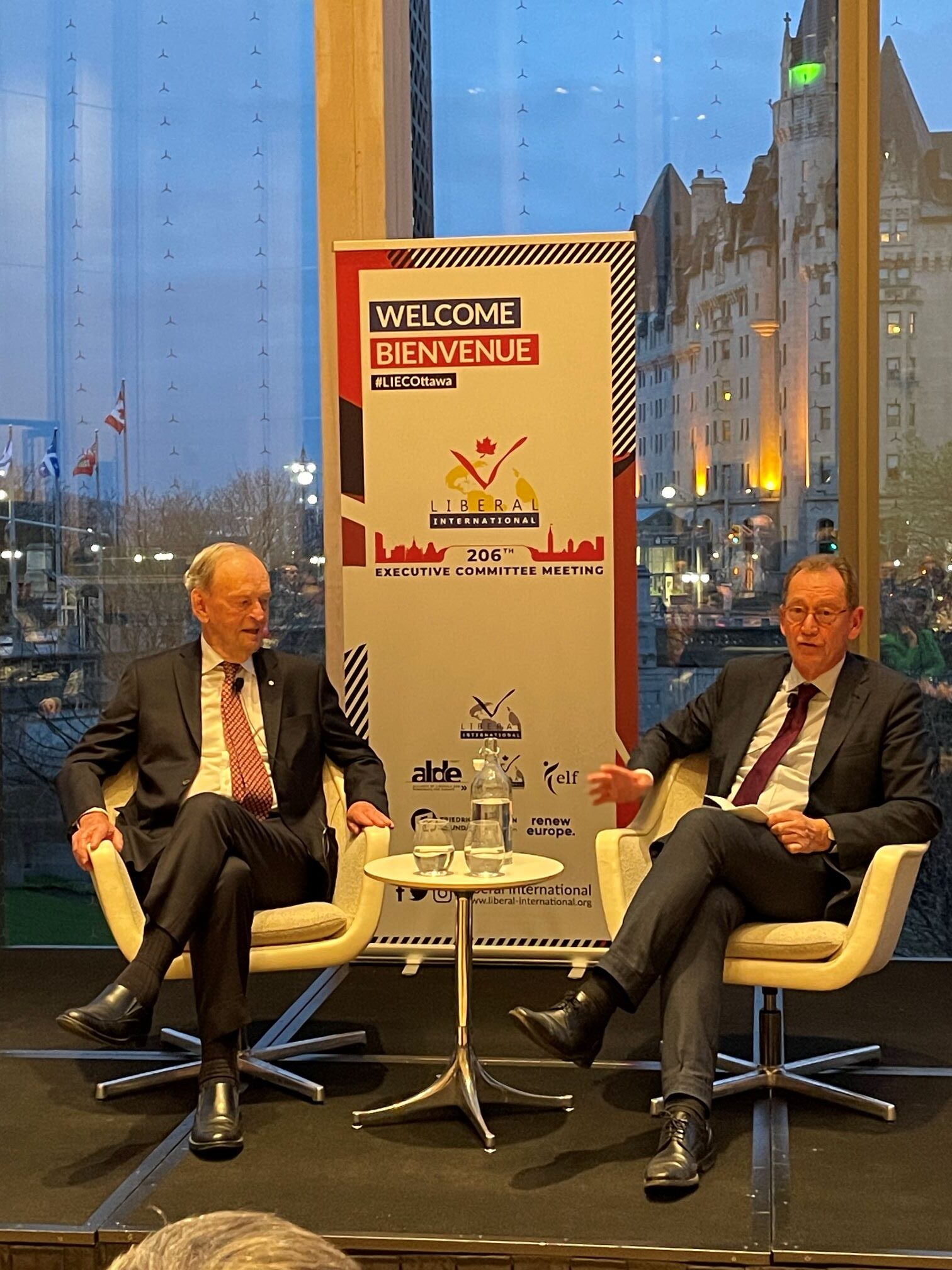
Mr Felix Maradiaga, who is an academic, political activist from Nicaragua and former Secretary General of the Ministry of Defense and Presidential Candidate was arrested in June 2021 and held in solitary confinement in Nicaragua by the President Ortega’s regime for the alleged crime of “conspiracy to undermine national integrity” In February this year he was suddenly released, exiled and flown to the US with 221 other political prisoners. So it does help to get political prisoners free by keeping their names well known, giving their family (often in exile) recognition, giving a voice to political movements in exile and keep giving the prisoners as much as possible emotional help! It must become in the self-interest of the regime to release the political prisoner! The work of the LI HRC remains very necessary.
The last evening FNF sponsored a dinner in the National Art Centre, with as special guest Rt. Hon. Jean Crétien, former Prime Minister of Canada (1993-2003).
The Dutch ladies were invited to attend a meeting of the women parliamentarians and women ambassadors by MP. Leah Taylor Roy. At this meeting we met our Dutch ambassador Ines Coppoolse, she invited the Dutch ladies to attend the 4th of May Netherlands Remembrance Day with the wreath laying ceremony, which we did. For them as Dutch it was moving to be able to commemorate in the Canadian cemetery those Canadians who died while freeing the Netherlands during the Second World War.
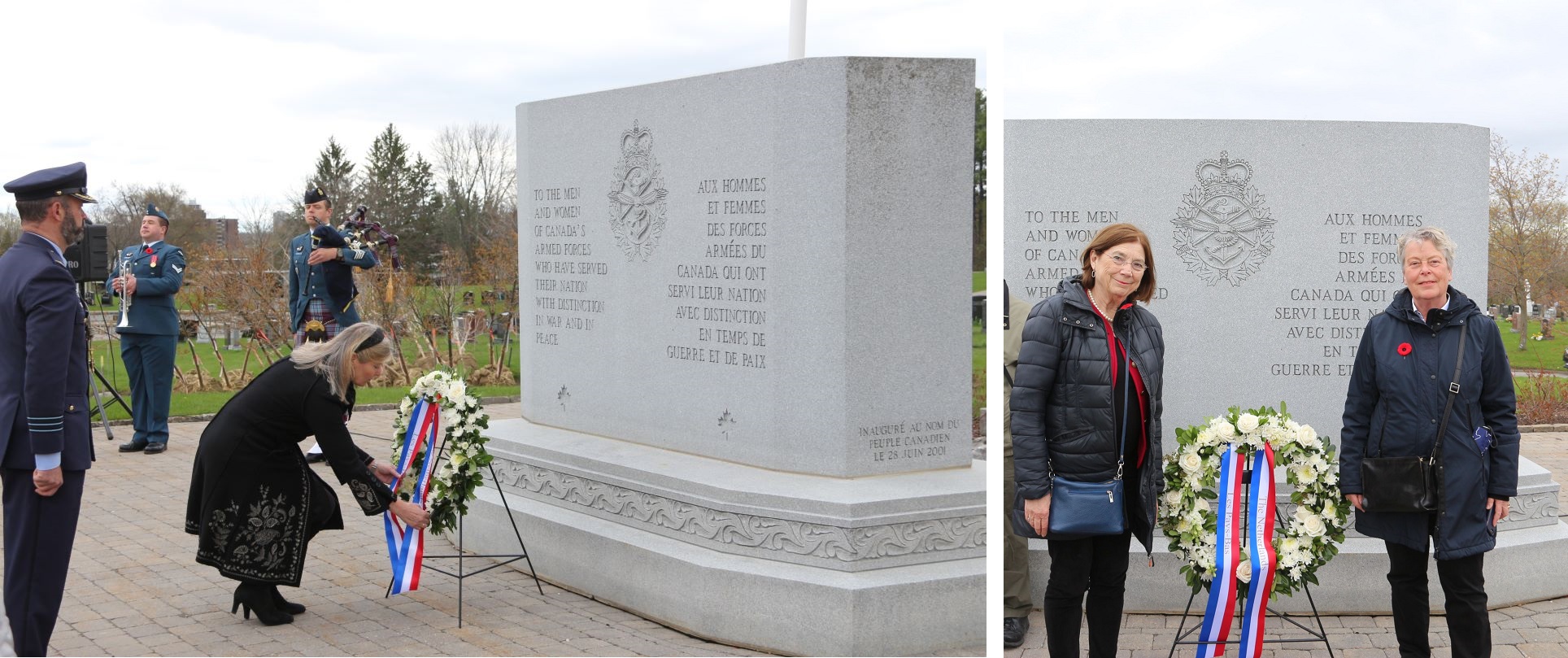
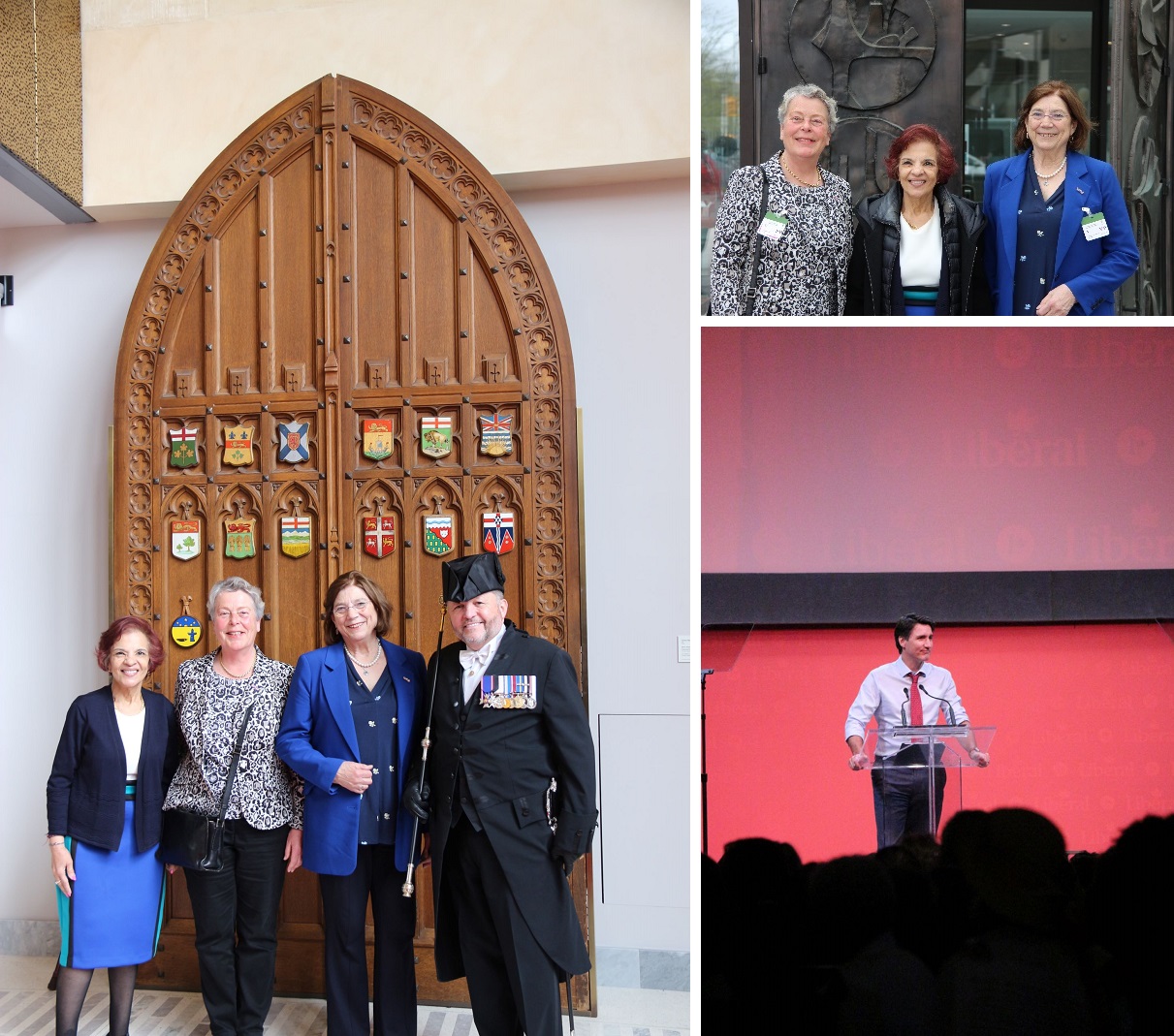
We also were invited to attend the Senate sitting as guest of Senator Mobina Jaffer, former President of INLW at the turn of the century.
At the start of the Canadian congress some of us attended the opening speech of Canadian Prime Minister Justin Trudeau.
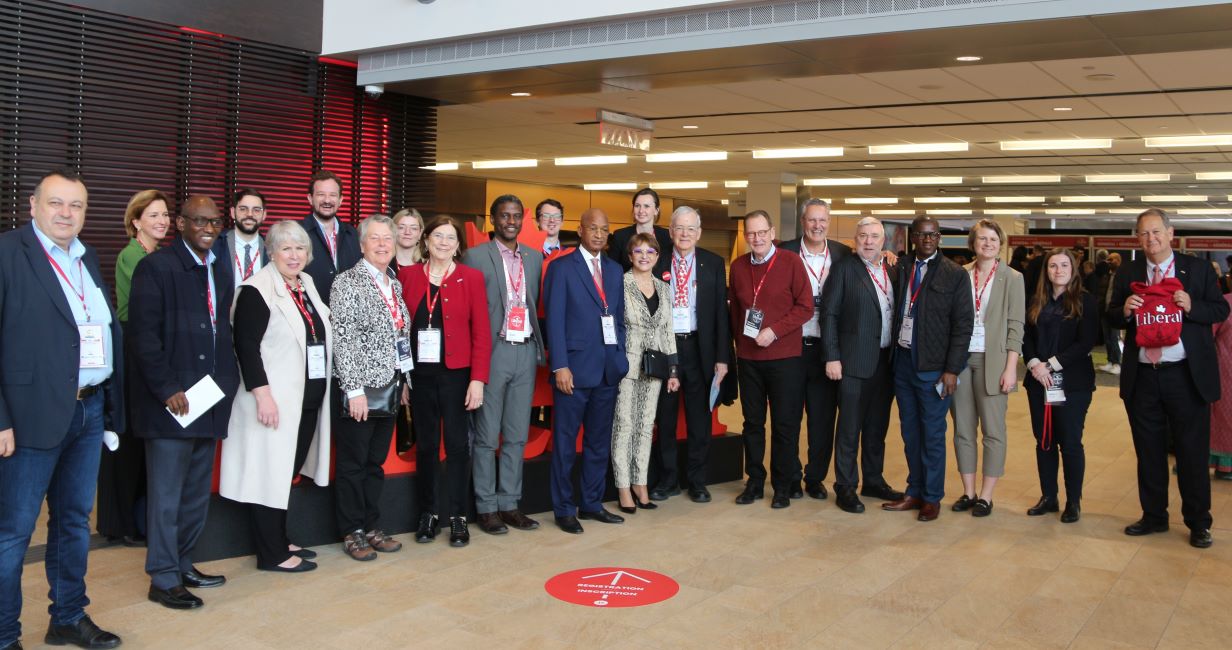
Photos: Danker van Valkenburg
The 67th session of the United Nations Commission on the Status of Women (CSW67) was held from March 6-17 at the United Nations headquarters in New York City. We hereby give you some parts of the speeches that were given at the opening session and also at the International Women’s Day. Also some of the conclusions at the end of CSW from Ms. Amina J. Mohammed.
There was a warm welcome of secretary-general Gutierrez at the opening of CSW “Today, women make up under a third of the workforce in science, technology, engineering, and maths. When women are under-represented in developing new technologies, discrimination may be baked in from the start.”

“Women and girls are leading efforts to make science and technology accessible, inclusive, and safe. Women and girls will not be silenced. Their demands for their rights and freedoms echo around the globe. The Commission on the Status of Women is a dynamo and catalyst for the transformation we need. Together, let’s push back against misogyny and forward for women, girls and our world.”
— António Gutierrez.
The UN 2023 Water Conference is 2 weeks behind us. Forty-six years after the last major UN Water Conference, the international community convened a historic meeting in New York to continue efforts to ensure safe water and sanitation for humanity.
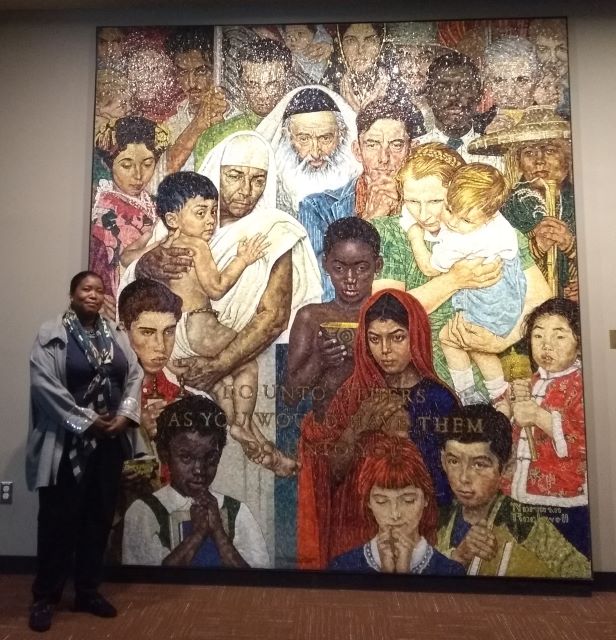
The conference proceeded through general plenary debate sessions and five interactive dialogues designed to be solution-oriented: water for health; water for sustainable development; water for climate; water for cooperation; and the Water Action Decade.
The event attracted more than 6,500 participants. By the end of the meeting, the Water Action Agenda had received approximately 700 commitments in the form of financial pledges, collaborative projects and actions to protect the world’s most valuable and irreplaceable resource.
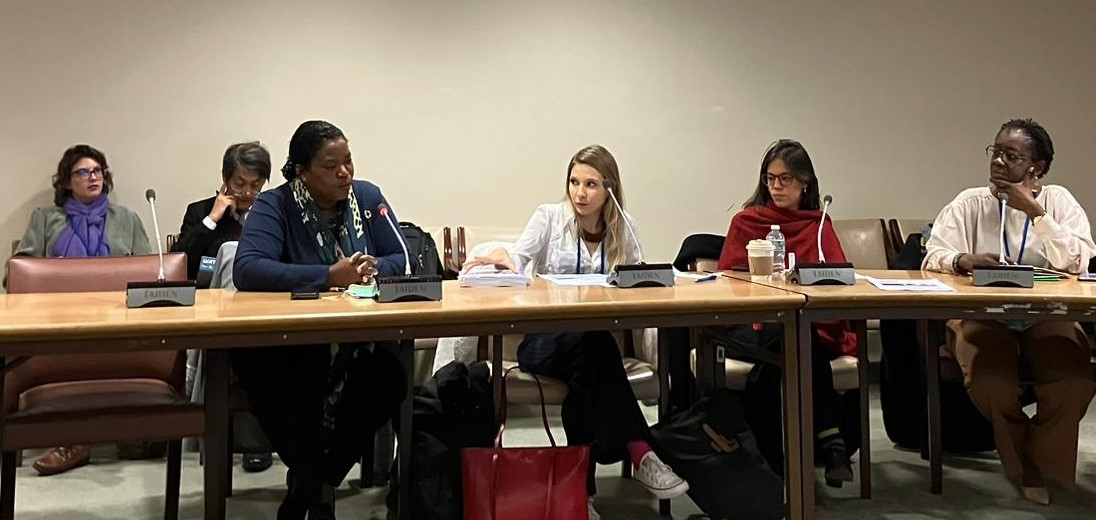
The focus on the 2023 Conference was the Water Action Agenda, which is composed of voluntary commitments from UN Member States and stakeholders. These pledges address a broad set of themes aimed at creating partnerships and cooperation towards shared urgent, immediate, and accelerated action, and to establish a strong international mechanism to prevent the global water crisis from spiraling out of control.
Positive news is that people continue to focus on all parts of the Water Action Agenda because “Water is and will remain everyone’s business”. The agenda represents the bold determination of the global community to address water challenges through a more coordinated and results-oriented approach, demonstrating the universal commitment to achieving water security and providing a roadmap for a water secure future.
The meeting outcomes reflected, among others:
• The need to consider water as global common good and radically change the world’s value for water, and thus how we manage water;
• The water-food-energy nexus approach as a means to achieve sustainable and just development, catalyse ecosystem and water health, and mitigate risk;
• Innovative finance, including public-private partnerships, as a requirement for successful implementation of water-related goals and targets; and
• The need for water-related actions to include a human rights-based approach.

Ruth gave a number of presentations on various days during the UN water conference and held an official UN Water Conference side event.
She spoke on behalf of INLW at the special event:
Women & Men with SDG6 –Training and Gender Action Plan in leadership will improve Sustainable Water and Sanitation Management
Ruth talked about Educating and Empowering our women, girls and boys by introducing affirmative action programmes in water and sanitation management and give them training in technical aspects such as data engineers in the water sector. Also give the young women, girls and boys access to sanitation.
Ruth organized an official side event on behalf of INLW with partners. The side event was about Reflections on Women, Water, Culture and Education, Past, Present and Future at the Columbia University. Several Women speakers and men gave their point of view why it is so important to educate our young women, girls and boys in water and sanitation management and provide clean and drinkable water
Ruth gave a presentation on Ethics and Water management at the official Side event UN 2023 Water Conference on Water & Socio-Ecological Justice at the AIA New York Center for Architecture.
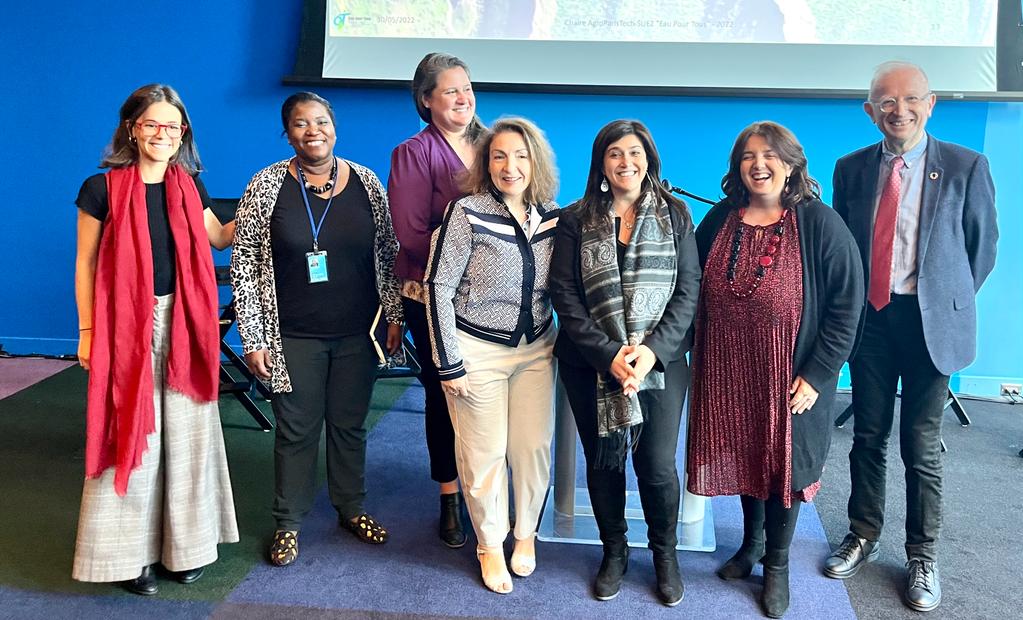
She addresses a problem that has so far been neglected by scholars investigating the Ethics of Big Data and policy makers in waste water treatment plants. The Ethics in Big Data by Preventing Legal inequality in Waste Water, however are not only an opportunity for sustainability, they also have some risks beyond the sensible preoccupation for privacy and security addressed by the Risk and initiative Global Pulse. Therefore, we must be careful about implementing our where abouts and private data to Wastewater treatments plants and particularly the impact it could have on the privacy of individuals. But doing this it will ultimately lead to a better water quality.
Ruth spoke on behalf of INLW and on behalf the Dutch Water Authority Rijnland at the Official Side event on Economic Resilience Through Water Resilience: Managing Economies for Uncertainty and Change Training SDG6 and Gender Action Plan in leadership will improve sustainable Water and Sanitation.
Ruth made her commitments on behalf of INLW and on behalf of the Dutch Water Authority together with other partners in the form of actions to protect the world’s most valuable and irreplaceable resource to:
📢 💧 💧 Prioritise water literacy for children & youth, young women, girls and boys.
📢 💧 💧 Invest in women, young women and youth-led solutions for #SDG6
📢 💧 💧 Provide action programmes in training and education for young women, girls and boys in technical data engineer and water and sanitation management.
📢 💧 💧 Involve women, young women and youth in water governance & accountability.
📢 💧 Provide water supply and equitable access to safe drinking water.
📢 💧 💧 Promoting female leadership in water resources and sanitation management.
📢 💧 💧 Include young women and women as stakeholders in water-related mechanisms, negotiations and decisions so that they can be part of the solution!
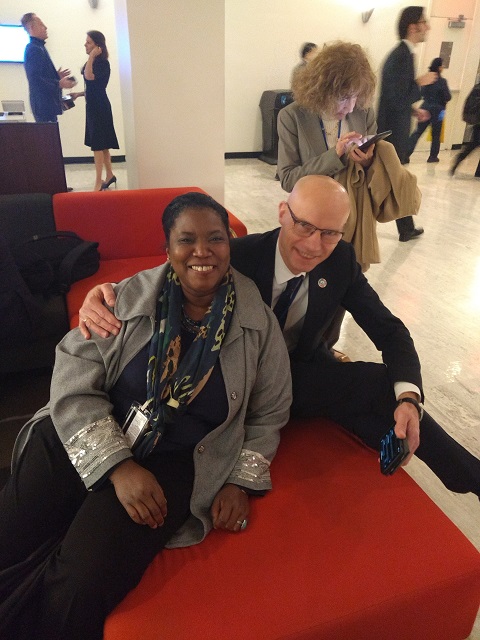
Partners:
INLW/Dutch Water Authority Rijnland ; • UNESCO Chair Water Ports and Historic Cities; • IHE Delft Institute for Water Education; • United Nations Economic Commission for Europe UNECE; • Womenvai; • World Federation of Engineers Organisation WFEO; • OISAT/WASAT • SUEZ – Chaire AgroParisTech Eau pour Tous; • Aquamatter • Brazil Water Gouvernement of São Paulo -SABESP • University of Campinas • University Bari Italy ; • Drinkable Rivers ; • UN Rivers ; • Consortium for Sustainable Urbanization and Columbia’s Center for Buildings, Infrastructure and Public Space.
https://www.youtube.com/watch?v=R1CNRROcQr4&t=3s
I would first like to thank everyone who contributed to organizing the side events. Especially Carola Hein from the UNESCO Chair Water Ports and Historic Cities for all her hard work in getting everything done. She brought out the best in me. She made it possible for us, together with other partners, to achieve our goals towards a great success during the UN Water Conference. Also many thanks to Frederick (Rick) Bell, Adjunct Associate Professor and Deputy Director of the Center for Buildings, Infrastructure and Public Space of Columbia University (New York City), FAIA for his support. And also many thanks to Miss Lylian Coelho Ferreira, Vice-President at Womenvai, she also made it possible; We have all done a great job!
Ruth Richardson
The 67th session of the United Nations Commission on the Status of Women (CSW67) was held from March 6-17 at the United Nations headquarters in New York City. This meeting was the long-awaited face-to-face global women’s summit that had been postponed for three years due to COVID-19 prevention measures. This year’s CSW67 registered a large number of participants, with over 7,000 attendees, including four heads of state and government, 116 ministers, 205 offsite events held by the United Nations, and approximately 700 non-governmental organizations participating in parallel forums.
Although the United Nations is not friendly to Taiwan due to pressure from China, Taiwanese women’s rights groups and non-profit organizations that support gender equality and women’s empowerment have not passively resisted but have courageously taken action and actively participated in the conference as NGOs. In total, Taiwanese NGOs organized 17 physical meetings and 15 online meetings. About 60 representatives from Taiwan traveled to attend the physical meetings of CSW67 in New York.
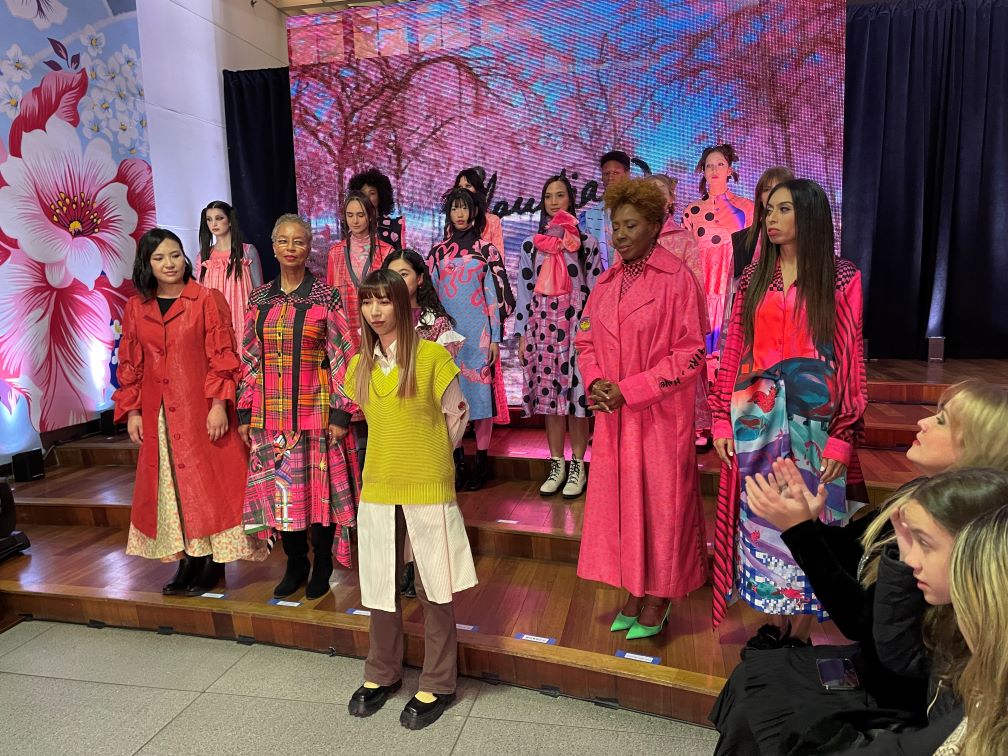
Especially with the support of the Women’s Empowerment and Development Foundation, along with the Taiwan Economic and Cultural Office in New York, during the CSW67 summit, Taiwan not only showcased its many years of efforts in gender equality and the impressive achievements of women’s participation in public affairs but also highlighted the contributions and achievements of Taiwanese women in the field of technology through two large-scale events hosted by TECO in New York: “Taiwan Night – Celebrating Women in Tech” and “Taiwan Main Stage”. These events echoed this year’s CSW67 theme – “DigitALL: Innovation and technology for gender equality” – emphasizing the importance of gender equality in the digital, innovative, and technological era.
Continue readingINLW Board member, Ruth Richardson, is busy preparing for the UN Water Conference next year in March 2023 (March 22-24, 2023) in New York. You find hereby an attachment about her presentation and the presentation itself. This presentation was given at the Climate Summit COP27 in Egypt, November 2022. .
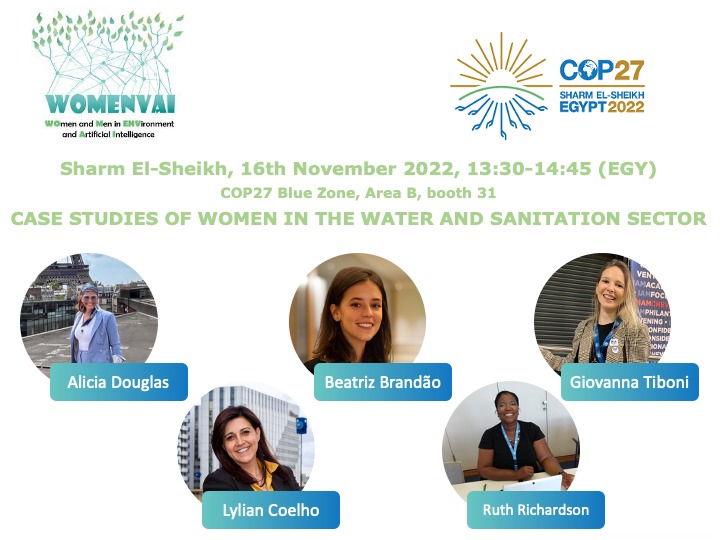
On Wednesday, November 16, 2022 at the Climate Summit, Ruth was in a panel discussion “Case Studies on Women in the Water and Sanitation Sector”, where she was allowed to give an online presentation about: “Invest in Women to tackle climate change and protect the environment” i.a. Wastewater treatment plants as a source of microplastic pollution and plastic waste.
She gave a brief talk about the history of wastewater treatment, about future challenges, pollution from plastic litter and microplastics in our wastewater treatment plants and about investing in women to tackle climate change and protect the environment.
Continue reading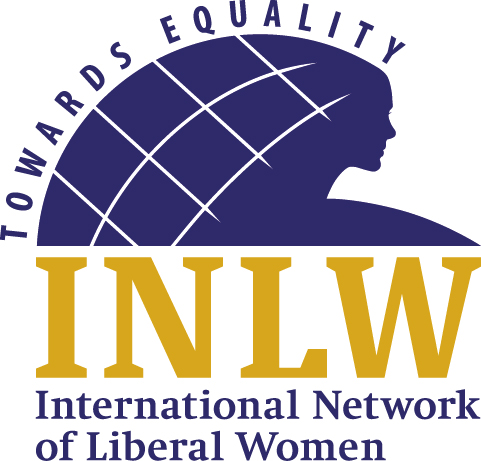
 Visit our Facebook page
Visit our Facebook page